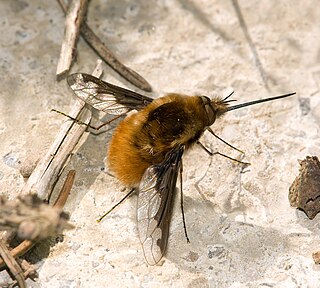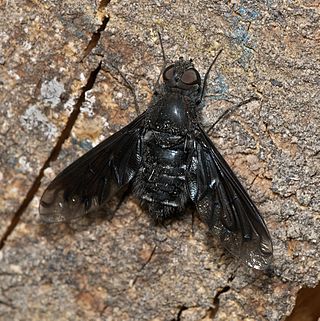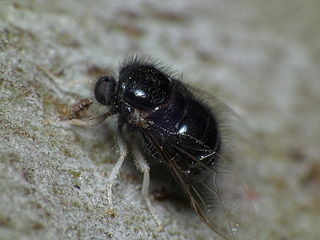
The Bombyliidae are a family of flies, commonly known as bee flies. Some are colloquially known as bomber flies. Adults generally feed on nectar and pollen, some being important pollinators. Larvae are mostly parasitoids of other insects.

Anthrax is a genus of bombyliid flies, commonly known as "bee-flies" due to their resemblance to bees. Most are dull black flies, and are usually small to medium in size, 4–20 millimetres (0.2–0.8 in), and many species have striking wing patterns.

The Asiloidea comprise a very large superfamily insects in the order Diptera, the true flies. It has a cosmopolitan distribution, occurring worldwide. It includes the family Bombyliidae, the bee flies, which are parasitoids, and the Asilidae, the robber flies, which are predators of other insects.

The Acroceridae are a small family of odd-looking flies. They have a hump-backed appearance with a strikingly small head, generally with a long proboscis for accessing nectar. They are rare and not widely known. The most frequently applied common names are small-headed flies or hunch-back flies. Many are bee or wasp mimics. Because they are parasitoids of spiders, they also are sometimes known as spider flies.

Bombylius major is a parasitic bee mimic fly. B. major is the most common type of fly within the Bombylius genus. The fly derives its name from its close resemblance to bumblebees and is often mistaken for them.

Dipalta is a North American genus of bee flies in the family Bombyliidae. There are two described species of Dipalta. The genus is closely related to Villa.

Balaana is a genus of flies belonging to the family Bombyliidae (bee-flies). There are about seven described species, including three from western Australia. These are robust and very hairy flies with a body length of 10–18 mm (0.4–0.7 in).

Brachyanax is a genus of bee fly in the subfamily Anthracinae. It was circumscribed by Neal Evenhuis in 1981. Thirteen species are recognized, and they are found in Asia and Australasia.

Villini is a tribe of bee flies in the family Bombyliidae.

Chrysanthrax is a genus of bee flies in the family Bombyliidae.
Villa chromolepida is a species of bee fly in the family Bombyliidae.

Villa agrippina is a species of bee fly in the family Bombyliidae.
Astrophanes is a genus of bee flies in the family Bombyliidae. There are two described species in the genus.
Anthrax cascadensis is a species of bee fly in the family Bombyliidae. It is found in the western United States, north into British Columbia, Canada.

Chrysanthrax cypris is a species of bee fly in the family Bombyliidae. It is a parasitoid of tiphiid wasps.
Anthrax pauper is a species of bee fly in the family Bombyliidae. It is found in the eastern United States from Texas north to Ontario, Canada.
Anthrax striatipennis is a species of bee fly in the family Bombyliidae. It is found in the southeastern United States.
Anthrax larrea is a species of bee fly in the family Bombyliidae. It is found in the United States.

Anthrax analis, the black bee fly, is a species of bee fly in the family Bombyliidae. It can be found throughout North America, from the Yukon east to Quebec in Canada, the entire mainland United States, most of Mexico, and as far south as Costa Rica and Cuba. As an adult it is a pollinator, and as a larva it is a parasitoid of tiger beetles in the genus Cicindela, and likely also of solitary bees. It is variable in appearance, with the posterior half of the wings usually transparent, but in the eastern United States the wings may be entirely dark.. The body itself is covered in black hair, but the tip of the abdomen usually has silvery scales.
Anthrax seriepunctatus is a species of bee fly in the family Bombyliidae. It is found in northwestern Mexico and the southwestern United States.










